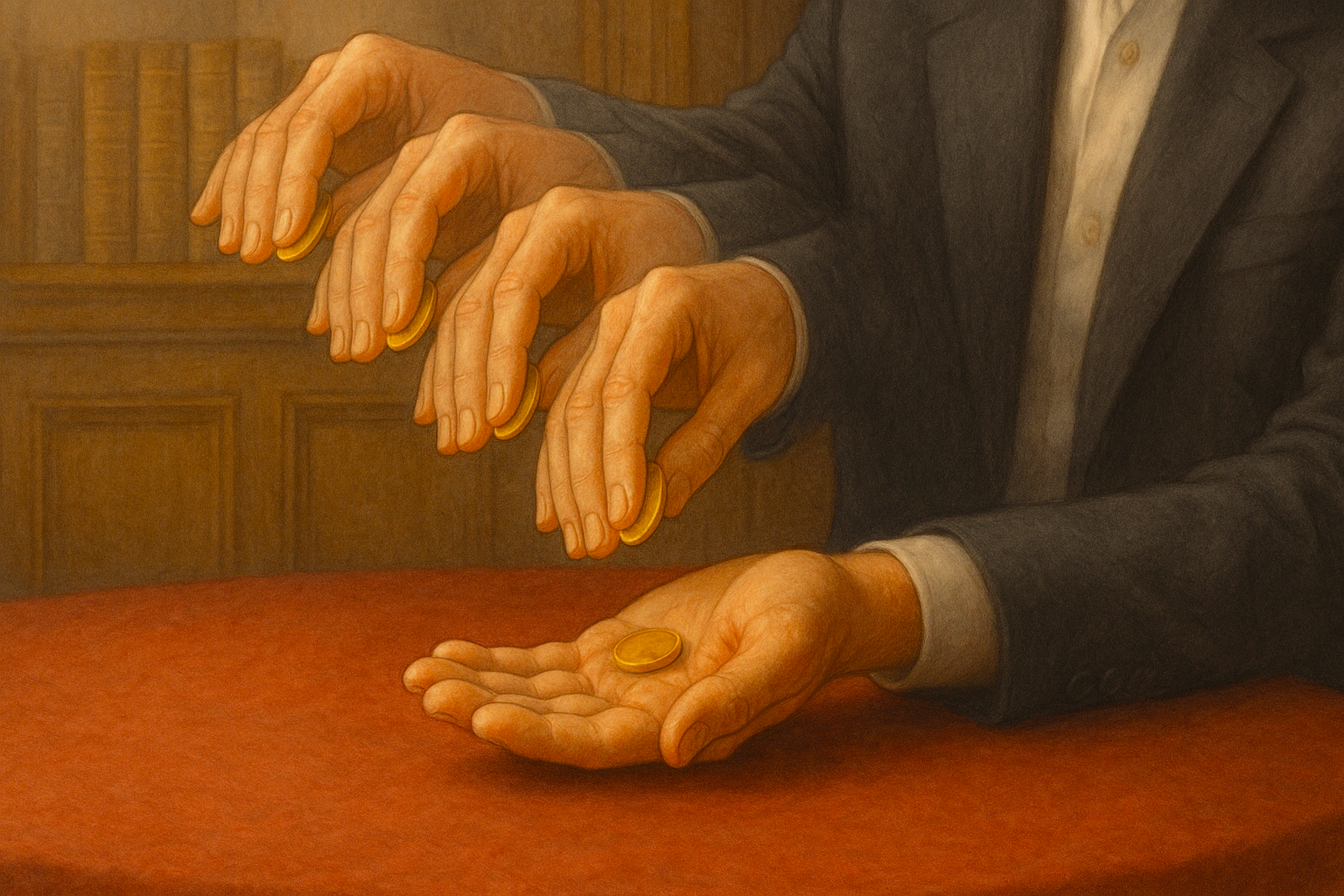Blinded Eyes, Twisted Words

Five Subtle Bribes That Corrupt Our Inner Judge
The Torah warns us in Parashat Shoftim (Devarim 16:18-19): שֹׁפְטִים וְשֹׁטְרִים תִּתֶּן־לְךָ בְּכׇל־שְׁעָרֶיךָ אֲשֶׁר יְיָ אֱלֹקֶיךָ נֹתֵן לְךָ לִשְׁבָטֶיךָ וְשָׁפְטוּ אֶת־הָעָם מִשְׁפַּט־צֶדֶק: לֹא־תַטֶּה מִשְׁפָּט לֹא תַכִּיר פָּנִים וְלֹא־תִקַּח שֹׁחַד כִּי הַשֹּׁחַד יְעַוֵּר עֵינֵי חֲכָמִים וִיסַלֵּף דִּבְרֵי צַדִּיקִם (Judges and officers you shall make for yourself in all of your gates which Hashem your G-d gives to you—to your tribes—and they shall judge the nation righteously. You shall not pervert judgment, you shall not show favoritism, and you shall not take a bribe, for the bribe blinds the eyes of the wise and twists the words of the righteous).
Chazal explain that even the smallest favor can sway a judge, clouding his eyes and bending his words until truth itself gets distorted. For example, it is taught (Ketuvot 105b): תָּנוּ רַבָּנַן: וְשׁוֹחַד לֹא תִקָּח אֵינוֹ צָרִיךְ לוֹמַר שׁוֹחַד מָמוֹן אֶלָּא אֲפִילּוּ שׁוֹחַד דְּבָרִים נָמֵי אָסוּר (The Sages taught: 'And you shall not take a bribe'—it is not necessary to say a bribe of money, but even a bribe of words is also forbidden). Non-monetary bribes can include such things as receiving favors and even accepting compliments.
It is not only the judges of Yisrael who must beware of such danger. Each one of us is, in a real sense, a judge over our own lives, charged with examining our deeds and weighing our actions (Eichah 3:40): נַחְפְּשָׂה דְרָכֵינוּ וְנַחְקֹרָה וְנָשׁוּבָה עַד־יְיָ (Let us search out our ways, and examine, and return to Hashem). Therefore, if bribery can blind the earthly courts, how much more so can "self-bribes" blind the inner court of our own conscience.
The language in Devarim 16:19 is calculated and precise. A bribe cuts two ways—it "blinds the eyes of the wise" and it “twists the words of the righteous." Not only is vision lost, but speech itself gets distorted—a two-step process of corruption. The first is that the eyes of judgment no longer see straight, and the second, the capstone—so to speak—is that even the inner voice of one's conscience gets bent into giving false testimony. When we apply this to self-judgment, the warning becomes sharp: the self-bribes that we accept not only keep us from seeing our flaws clearly, they also cause our conscience to speak with a crooked tongue, defending what should have been rebuked.
Therefore, if we are to preserve the clarity of our inner judgment, we must be alert to the many ways we can bribe ourselves. These bribes don't come in envelopes of cash but in subtle payoffs of illusion, defense, and ease. And they rarely strike all at once—they descend step by step, like a staircase. In what follows, we will trace five forms of self-bribery that, if we are not careful, can quietly blind our eyes and twist our words.
The first form of bribery is the self-image bribe. We like to see ourselves in a flattering light, so it's much easier to notice the flaws of others than to face our own. How does this bribe work? It slips our inner judge the payoff of a polished portrait. Instead of confronting our blemishes honestly, we airbrush them out, convincing ourselves that they don't even exist. The coin we press into our own palm is the soothing belief: "I’m fine just the way I am." Once that picture is in place, the conscience is forced to cooperate. Its words bend to fit the illusion, excusing what should be exposed. In this way, the desire to maintain a pleasing self-image blinds our inner vision. We no longer see the cracks that require repair, because the mirror itself has been doctored.
If left unchecked, the self-image bribe soon hardens into the pride bribe, the shield of self-importance. Here the motive isn't flattery, but defense. We want to be seen—by ourselves and by others—as strong, capable, and in control. Admitting weakness feels like a threat, so pride rushes in to protect our standing. Instead of being convicted by our inner voice, we reinterpret the rebuke as a compliment. "This isn't arrogance," we insist, "it's leadership, it's strength." Pride blinds us not by deleting flaws, but by disguising them as virtues. The conscience, once a stern witness, becomes a cheerleader. The truth that should have humbled us ends up feeding our ego. Thus the shield of self-importance becomes a bribe every bit as corrupting as money slipped under a judge's table—the verdict is bent before the trial even begins.
But pride cannot stand alone. To sustain itself, it must construct a story to defend its claim. This is where the rationalization bribe steps in. Since we don't like to admit we are wrong, we pay ourselves off with a little story that makes our actions sound acceptable. Instead of seeing our choices for what they are—excuses that cloud our vision—we invent ways to justify them. "I didn’t really have a choice," we tell ourselves. "Anyone else would have done the same thing." Or perhaps, "What was I supposed to do? Be realistic. I was just being sensible." That's the blindness phase. And once that takes place, the second phase arrives—our conscience gets twisted. Instead of saying, "You messed up and you need to make it right," we hire our inner voice to act as our defense attorney. It begins arguing our case, justifying what should have been internal rebuke. But it's the same old bribe all over again—not of money, flattery or ego, but a narrative we spin for ourselves, a story designed to let us off the hook.
And once the stories are built, we settle into them, leading us to the fourth one—the comfort bribe. We like our routines, our ease, our familiar patterns. After all, who really wants to disturb their comfort? It's difficult to break out of our comfort zone. So how does this bribe work? First, it whispers to our inner judge, 'Patience is balance. Prudence is safety. Stability is wisdom. Why unsettle what already works?' And once we've laid the foundation for this type of blindness, the second phase, the twisting of our inner words, slips in easily. The truth which is supposed to be our ally starts sounding like an enemy, perceived as a threat seeking to take away everything that gives us structure and order. We repackage laziness as balance, fear as prudence, and stagnation as patience. And so, it is the same old coin slipped into the judge's hand—another payoff that blinds our eyes from seeing the work that teshuvah requires.
But if comfort lulls us into inaction, the final step is even more dangerous—the pleasure bribe, the lure of what feels good right now. This one doesn't whisper, "Stay where you are," like the comfort bribe does. Instead it says, "Take this right now." To clarify: while comfort bows to inactivity, pleasure chases instant gratification. First comes the blindness—the sweetness of indulgence blocks out any consideration of future cost. "I want this now. After all, I desire it," or, "Why not? It's just a little thing." Twisted words follow in quick succession. Instead of hearing the gentle warning, "Be careful, this will cost you later," our conscience gets dragged into saying, "You need this. It's good for you. It will keep you sane." And so indulgence gets relabeled as necessity. But pleasure itself is not the problem—Hashem created it, after all. But when we let it bribe us, it blinds our eyes and bends our words, until the very gift He gave us is turned against us.
Putting them together, we see not five random bribes but a staircase of descent: self-image that flatters the mirror, pride that defends the throne, rationalization that spins the story, comfort that clings to ease, and pleasure that seizes the immediate. Step by step, each bribe blinds the eyes a little more and twists the words a little further, until the inner judge no longer serves the truth.
So why does all of this matter beyond our own inner honesty? If self-bribery makes us blind, what is it that we can no longer see? R' Nachman of Breslov thoughtfully leads us to the answer (Likutei Moharan 54:2): וּמַזְמִין לוֹ לְכָל אָדָם מַחֲשָׁבָה דִּבּוּר וּמַעֲשֶׂה לְפִי הַיּוֹם וּלְפִי הָאָדָם וּלְפִי הַמָּקוֹם וּמַלְבִּישׁ לוֹ בְּזֹאת הַמַּחֲשָׁבָה דִּבּוּר וּמַעֲשֶׂה שֶׁמַּזְמִין לוֹ רְמָזִים כְּדֵי לְקָרְבוֹ לַעֲבוֹדָתוֹ (And [Hashem] arranges for each person thought, speech, and deed—according to the day, according to the person, and according to the place—and He clothes for him, within this thought, speech, and deed that He arranges for him, hints in order to draw him close to His service). Every day Hashem places these hints before us, tailored to our soul, our place, and our moment. But if we accept the bribes that we give ourselves, our eyes are blinded, and the very hints—the intimate hashgachah pratit—that could have guided us pass by unseen. And that would be a terrible tragedy.
The Torah warns that a bribe blinds the eyes of the wise and twists the words of the righteous—and when the inner judge is compromised, even Hashem's voice is distorted. But when we guard our inner court, Hashem's hints remain clear, guiding us step by step, day by day, closer to His service.




![Blood [is] Money](https://www.theshoemakerreport.com/wp-content/uploads/2025/02/doctor.healer-768x429.jpeg)

